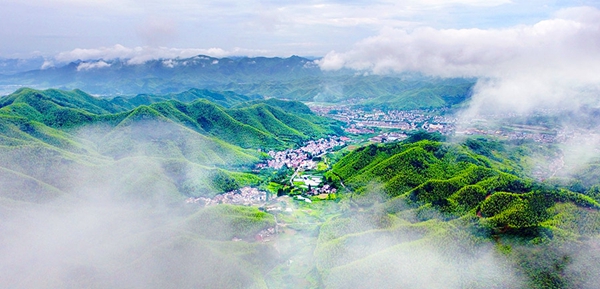This is Huzhou

Ecological Yu village in Anji county in Huzhou, Zhejiang province [Photo/huzhou.gov.cn]
Population: 2,980,000 permanent residents
Location: northern part of East China's Zhejiang province and the center of the Yangtze River Delta region
Area: 5,820 square kilometers
Economy:
In 2018, Huzhou achieved sustained, rapid and coordinated development. It realized a regional GDP of 271.9 billion yuan ($ 39.45 billion), at a year-on-year growth rate of 8.1 percent, ranking second in the province.
The added value of primary industry was 12.77 billion yuan, increasing by 2.8 percent, secondary industry was 127.36 billion yuan, rising by 8.2 percent, and the tertiary industry reached 115.25 billion yuan, growing by 9.2 percent.
Administrative divisions:
Huzhou's jurisdiction includes two districts, Wuxing and Nanxun, and three counties, Deqing, Changxing and Anji.
Brief introduction:
As a national historical and cultural city with a history of human activities for over 1 million years and a construction history of over 2,300 years, Huzhou is the only southern city famous for its lakes, which are centered around Taihu Lake. It is a node city connecting the north and south areas of the Yangtze River Delta region, as well as East and Central China.
Huzhou is the source region for silk, writing brushes, tea, porcelain and liquor, and has been a land of silk, fish, rice and culture for a long time. Hubi, the first material of the Four Treasures of the Study (writing brush, ink stick, ink slab and paper), refers to the writing brush that originated in Huzhou. Qianshanyang Site in the city, known as the source region of the world's best silk, reveals the history of raising silkworms and making silk over 4,000 years. Husi (silk produced in Huzhou) won the gold award at the first world expo held in London in 1851. Chinese Tea Saint Lu Yu completed The Classic of Tea, the world's first masterpiece related to tea, was based on the tea in Huzhou.
The city has been regarded as the birthplace of the saying "lucid water and lush mountains are invaluable assets", and is considered the most typical example of China's beautiful countryside, the pioneering area of ecology plus and an ecological conservation area around the Taihu Lake Basin.
Currently, Huzhou is striving to create a modernized ecological lakeside city of high quality and to build a moderately prosperous society in all respects.
